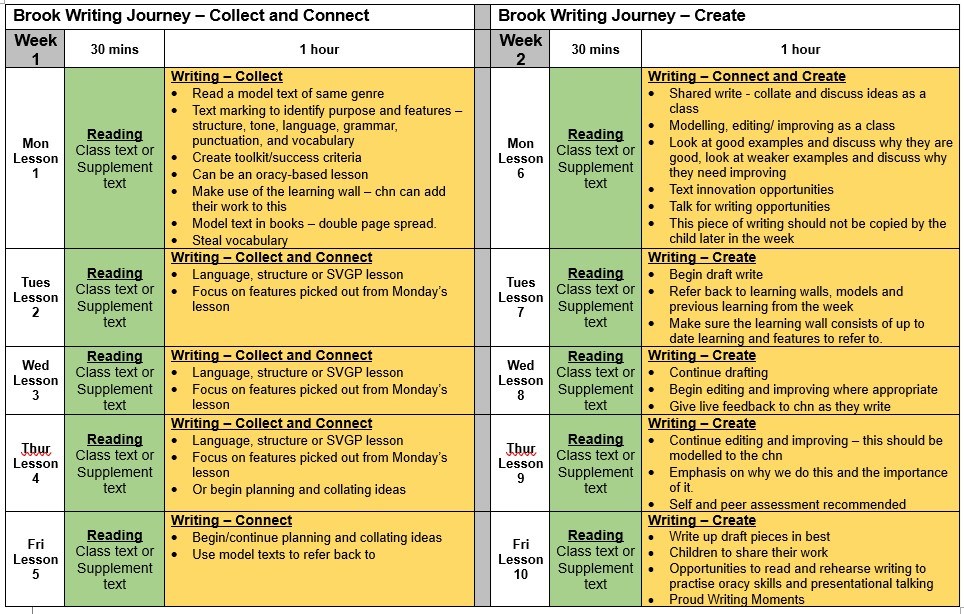English Curriculum at Brook Year 1 to Year 6
Intent Statement
At Brook Primary, we aim to equip every child with a high-quality education in English which will teach pupils to speak, read and write fluently so that they can communicate their ideas and emotions to others in real-life experiences now, and throughout later life.
As a school, we want to promote high standards of language by equipping pupils with a strong pupil voice using the ‘Voice21 Oracy Framework’. Oracy underpins all of children’s learning here at Brook Primary. We aim for our children to be able to express themselves confidently, making sure that children are exposed to new vocabulary every day, we encourage conversation, and role play to help children practise for real life experiences.
When our children leave Brook Primary we expect them to be avid readers and have developed their love of literature through widespread reading for enjoyment. We create an atmosphere that promotes a love of reading through exposing pupils to a variety of rich texts, authors and experiences. We are determined that every pupil will read fluently and enthusiastically and we strive to create children that ‘love’ to read!
Utilising both their oracy and reading skills, we will support children to write with confidence and accuracy for a variety of purposes and audiences, whilst developing their own individual flair. We want our children to be able to write with grammatical accuracy and be able to apply spelling patterns correctly using a neat handwriting style.
Ultimately, we aim for our children to apply all of these English skills to ALL areas of the curriculum.
Our Writing Journey
Here at Brook we use a core text approach to deliver our English curriculum. Our reading and writing tasks are based around a quality text (you can find our text overview for each year group in the reading information) and the writing journey follows the 3C’s: collect, connect and create. This process is completed over no more than 2 or 3 weeks depending on the genre of writing (a narrative may take longer to create).
- Collect: each unit begins with a ‘ponder and predict’ session where children use the front and back cover information to formulate suggestions about the genre and storyline of the book. Children are then introduced to the writing task and investigate the key features required.
- Connect: these key features are then taught alongside discrete spelling, punctuation, grammar and vocabulary lessons to provide children with the skills and learning opportunities to connect all their collected ideas together.
- Create: once these skills have been taught, practised and refined in context, the children use the key features taught to create their draft write, before editing, improving and peer assessing each other’s writing. Finally, the children produce their final piece: a ‘Hot write’, which has a writing context to explain the writing journey followed, demonstrating the skills they have learnt and showing they are able to write independently for purpose.

English Research Review – July 2022
Research suggests that explicit instruction about writing knowledge and strategies can develop pupils’ writing. Self-regulated strategy development (SRSD) is an approach to teaching writing strategies that has been found to be effective in helping pupils learn the specific knowledge needed for effective writing. The 6 stages of SRSD are:
- Pupils are taught the background knowledge they need to use a writing strategy effectively.
- The teacher explicitly describes and discusses the purpose and benefit of the strategy.
- The teacher models how to use the strategy.
- Pupils memorise the steps/components of the strategy.
- The teacher supports and scaffolds pupils’ mastery of the strategy.
- Pupils use the strategy independently.
Our writing journey at Brook follows the stages of SRSD and supports the development retention of writing features and independence when writing for purpose.
Quality First Teaching
In our English lessons at Brook we aim to provide the children with:
- daily teaching of phonics in EYFS and KS1
- vocabulary development
- a wide range of oracy opportunities
- opportunities to practise, refine and apply literary techniques
- access to decodable and increasingly complex texts
- knowledge about how to write effectively and purposefully
- opportunities for repetition where necessary
- purposeful activities to form their learning journey
- independence when writing for purpose
- feedback and assessment for learning to move forward where appropriate
- challenge for those children who are much more able writers.


